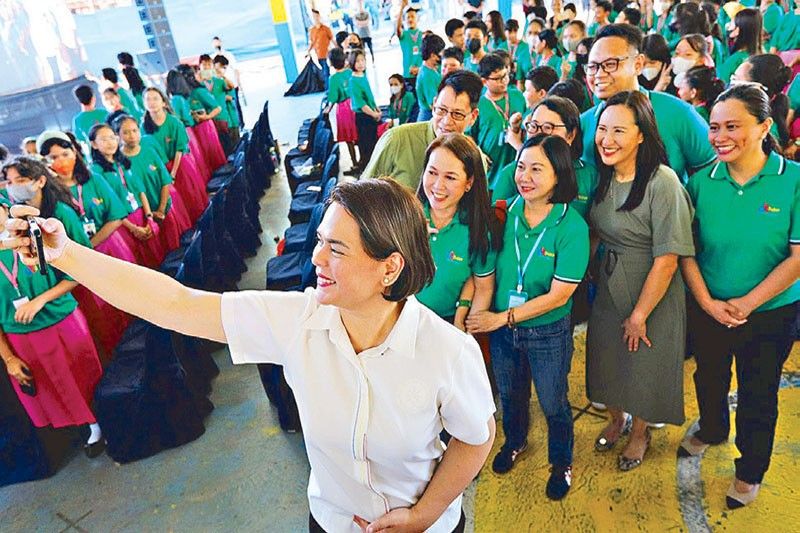Sara won’t resign as Vice President , DepEd chief

MANILA, Philippines — Vice President and Education Secretary Sara Duterte will not resign from her posts, dispelling confusion over her supposed plan to run in the 2025 elections.
“I did not say anything like that in my speech. That is why whenever someone asks, I say that whatever I laid down in my speech is clear. I believe since the interpretation is line per line and not the speech as a whole, there tend to be questions,” Duterte told reporters yesterday.
She said parts of her speech were misconstrued by some people, which caused confusion regarding her political plans.
Duterte announced her intention to run in “the next elections,” while also saying that her brothers, Davao City Mayor Sebastian Duterte and Davao City 1st District Rep. Paolo Duterte, are no longer running for office in 2025.
She was quoted in Cebuano as saying that she is “campaigning for the next elections,” even as her term as vice president ends in 2028.
The Vice President reiterated that everything about running for office was laid down in her speech in Barangay Bago Gallera in Davao City, and that the confusion was because of the “piecemeal appreciation” of the people in what she was saying.
“It means, they remove one line to get the interpretation that they want,” she said.
Duterte did not comment on President Marcos’ statement that she could have been testing the waters.
“President Marcos and I haven’t talked about the next elections,” the Vice President said. “The UniTeam is our tandem when we ran for president and vice president in the last elections, that’s it. Now, the two of us, we were elected as President and Vice President, we both do our jobs for our country.”
Duterte said her political plans do not involve her apparent rift with Speaker Martin Romualdez.
“I cannot speculate what the Speaker is thinking. I don’t know him that well. Our friendship is not that deep for me to be able to speculate,” the Vice President said.
She added that she has not received any document from the International Criminal Court.
Increased budget
Meanwhile, the budget for the mental health and school-based feeding programs of the Department of Education (DepEd) has more than doubled this year, as Duterte underscored the importance of protecting the overall well-being of students.
The Vice President welcomed the increased budget for the two programs, saying that this would help support both the mental and nutritional health of learners in the country.
“Physical and mental health are important to the schooling of a learner or student, that is why we launched whatever we did in 2023 to improve the school-based feeding program (SBFP) and mental health program (SBMHP) and what we will do moving forward,” she told reporters during the national launch of the SBMHP and the official kick-off of the SBFP 2024 at the Esteban Abada Elementary School in Quezon City yesterday.
Budget for the SBMHP jumped 116 percent to P210 million for this year, from P97.2 million last year.
The DepEd said that this additional funding would be utilized to hire more personnel in schools, provide program support funds for field offices and provide salary grade increase for registered psychologists.
The SBFP budget, on the other hand, saw a 106-percent increase to P11.7 billion for this year. This will allow cost allocation per meal to go up to P25, compared to P18-P21 in previous years.
The DepEd is targeting to provide feeding days to all 220 school days for student-beneficiaries.
Despite additional funding that the agency had fought for, Duterte admitted that this is still not enough to address the plethora of problems besetting the school system.
“We’re still far from the ideal spending per student for education. It’s always been like that. The DepEd understands that many government departments are in need of budget that’s why the budget needs to be spread out to various agencies and needs of the society,” she said.
The DepEd noted that there have been slight decreases in the number of wasted and severely wasted learners, which account for 8.56 percent and 3.6 percent of total students in the country from 2022-2023 – down from 9.58 percent and 3.94 percent in 2019-2020.
- Latest
- Trending































